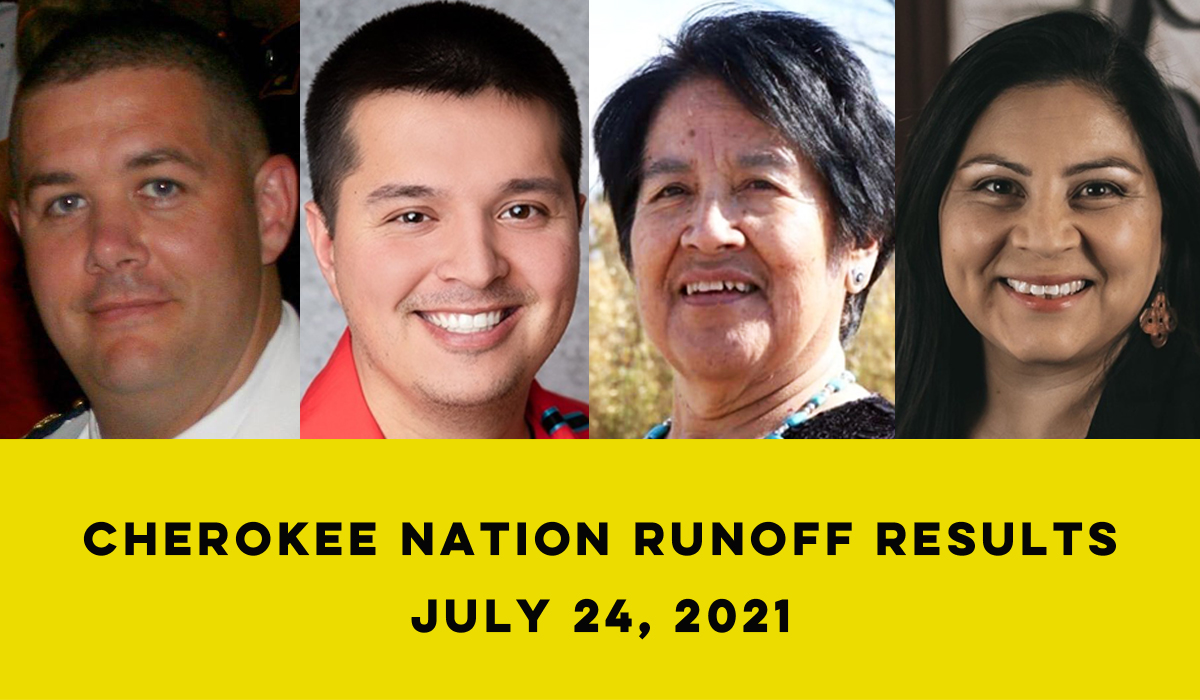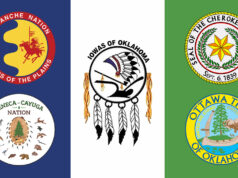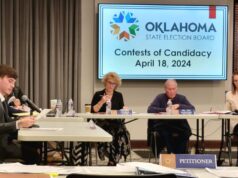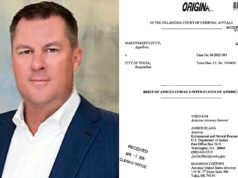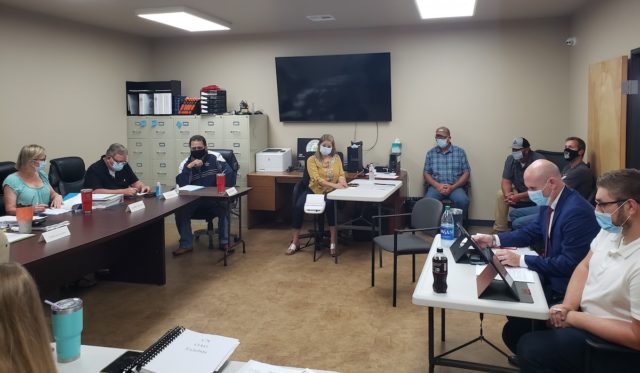
CHEROKEE NATION / TAHLEQUAH — After the disqualification of one candidate for depositing an improper check and the rejection of another candidate’s legal challenge by the Cherokee Nation Supreme Court, the outcome of the 2021 Cherokee Nation election is scheduled to be certified at 4 p.m. today.
Cherokee Nation District 2 Tribal Council candidate Bobby Slover was disqualified nine days after the tribe’s July 24 runoff election for accepting an improper check from a corporate entity, Action Floors, LLC. Additionally, Slover was fined $3,000 by the Election Commission.
Item A in Section 43 of the Cherokee Nation election code states, “Contributions may only be made by individual natural persons. No corporation, partnership, and/or any other legal entity shall contribute to any Cherokee Nation campaign or candidate.”
On Aug. 2, Cherokee Nation Election Commission members voted 4-0 to disqualify Slover following the recusal of one commission member. Slover’s attorney, AJ Ferate, said his client did not file an appeal of the election commission’s decision by Monday’s deadline.
In the District 2 Tribal Council election, Candessa Tehee received 367 votes to Slover’s 360. Slover did not file legal challenges of the election.
However, Cherokee Nation District 7 Tribal Council candidate David Comingdeer did file challenges in his race Aug. 2, along with several affidavits. Comingdeer finished 44 votes behind Joshua Sam for the District 7 seat. A hearing was held before the Cherokee Nation Supreme Court on Friday, Aug. 6.
PREVIOUSLY
Cherokee Nation runoff: Two candidates request recounts, consider challenges by Joe Tomlinson
In the opinion of the Cherokee Nation Supreme Court released Sunday, Comingdeer’s challenges were “deemed frivolous and dismissed with prejudice for failure to state a claim upon which relief can be granted.”
Comingdeer’s attorney, Tahlina Nofire, said that despite the Cherokee Nation Supreme Court’s decision, the legal challenge highlighted “a violation of federal law.”
“We presented our evidence and facts brought to us by voters with concerns of potential fraud. My client, as a candidate, had a responsibility to address these potential issues,” Nofire said. “We uncovered a scheme where campaign mailers were sent using the U.S. mail to registered voters purporting to be from the Cherokee Nation Election Commission with the intent to deceive and persuade voters into filling out absentee ballot request forms, which we believe to be a violation of federal law.”
Comingdeer had also alleged that Sam acted improperly by notarizing absentee ballots for voters in his own race.
“The decision to dismiss our appeal and allow a candidate who is an Oklahoma state licensed notary to notarize their own ballots and handle or otherwise collect them opens the door to cheating and creates a lack of trust in the integrity of our tribal elections,” Nofire said.
Sam’s attorney, Carly Griffith Hotvedt, said her client “ran a clean campaign” and complied with the law.
“While we were disappointed that this unfounded and unsupported appeal was brought in the first place, we are very pleased that the Cherokee Nation Supreme Court recognized that there was no evidence presented that could substantiate any claim of fraud or improper activity by Joshua Sam,” Griffith Hotvedt said. “Mr. Sam ran a clean campaign, compliant with the law. By declaring this suit frivolous and dismissing the action, the Cherokee Nation Supreme Court recognized the will of the voters of District 7 and refused to permit vague and defamatory accusations of fraud to be perpetuated not only against Mr. Sam but the employees of the Election Commission and the Commissioners as well.”
She added that “election integrity matters.”
“Malicious allegations of election fraud that would impugn the reputation of candidates and their campaigns should be stopped in their tracks, especially those that cannot provide proof of allegations,” Griffith Hotvedt said. “Candidates seeking office should take ownership of their requirements to comply with Cherokee Nation election laws and not abuse the election appeal process for no other reason than an unfavorable outcome at the ballot box. Mr. Sam looks forward to serving as the next councilor for District 7.”
The Cherokee Nation Supreme Court’s opinion and Comingdeer’s filed challenges with attached affidavits are linked at the bottom of the article.
Both Slover and Comingdeer filed recount requests to the Cherokee Nation Election Commission on July 28, but both requests were denied because each failed to “serve a copy of the request” to their respective opponents — Tehee and Sam — which is required by Item C in Section 93 of the Cherokee Nation Election Code.
A copy of the Supreme Court order detailing the recount request denials is also linked at the bottom of the article.
Commissioner recused in Slover hearing
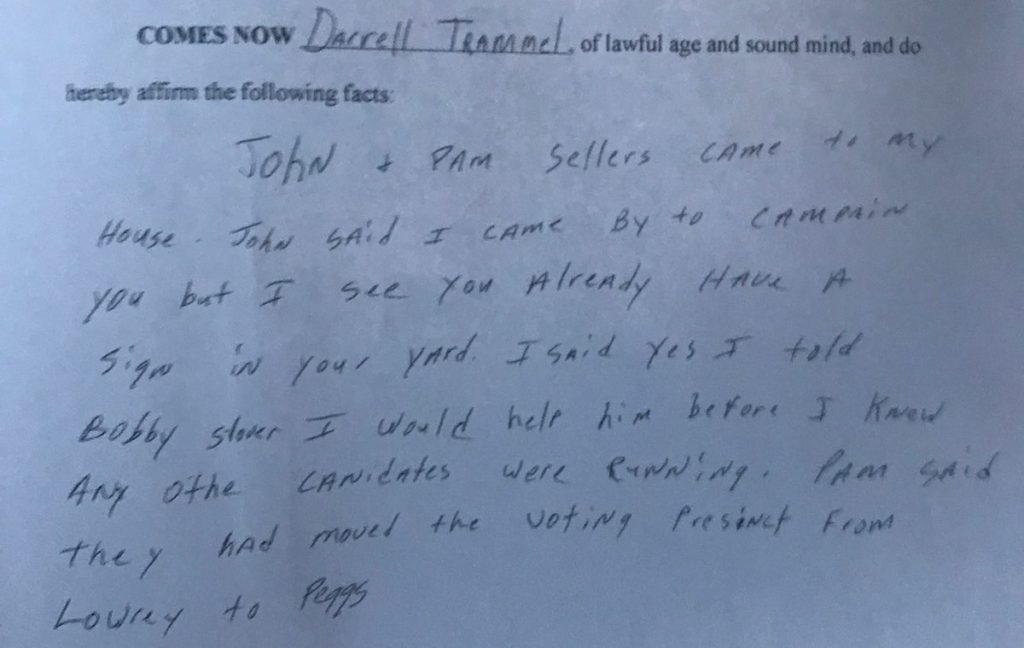
Seven minutes into the Cherokee Nation Election Commission’s Aug. 2 hearing about the felony charge facing Slover, commissioners went into executive session to discuss whether Vice Chairwoman Pamela Sellers would recuse.
Ferate, Slover’s attorney, had filed an affidavit completed by Darrell Trammel that claimed Sellers and her husband, John, were trying to campaign to him on behalf of Tehee, Slover’s opponent.
“Even if they say they can be impartial, there’s a risk and a concern,” Ferate told NonDoc while the commission was in executive session. “It meets the required rules for this commission. They are to remain impartial. They are not to support candidates or anything like that.”
Soon thereafter, the Election Commission returned to open session and Sellers recused for the remainder of the hearing.
Timeline regarding Slover’s charge
Sometime in June — the exact date is unknown — a $1,000 check from Action Floors, LLC was provided to Slover’s campaign. Action Floors, LLC is owned by friends of Slover, Jeff and Darla McCarty. The couple testified that Jeff McCarty asked Darla to write the check to Slover’s campaign in the name of their company. They said they did not know it was illegal to do so.
During his testimony, Jeff McCarty said the check was written for Slover but was not picked up from the Action Floors office until two or three weeks later by Slover’s wife. Slover’s wife picked up the check — which was folded in a sealed envelope — and brought it to Slover, who was with his daughter and financial agent, Shannon Dallis, at Lake Tenkiller.
According to Slover’s testimony, he opened the envelope and the folded check and only saw the $1,000 amount. He said he did not see from whom the check was written. Slover said he knew the check was from Jeff and Darla McCarty, but he claimed he did not see it was written from their company account.
On July 14, Dallis submitted Slover’s campaign financial disclosure report, which indicated a contribution from Action Floors, LLC on June 18. On July 20, Dallis submitted a revised financial disclosure report that changed the contribution from Action Floors, LLC to a contribution from Darla and Jeff McCarty.
On July 21, the Cherokee Nation Office of the Attorney General filed a felony charge against Slover. Prior to the charge being filed against — according to Ferate — Slover wrote a check of $1,000 to Action Floors, LLC, which was deposited the same day, July 21.
On July 29, Dallis submitted a revised campaign financial disclosure report marking through the contribution from Jeff and Darla McCarty.
Arguments in the Slover case
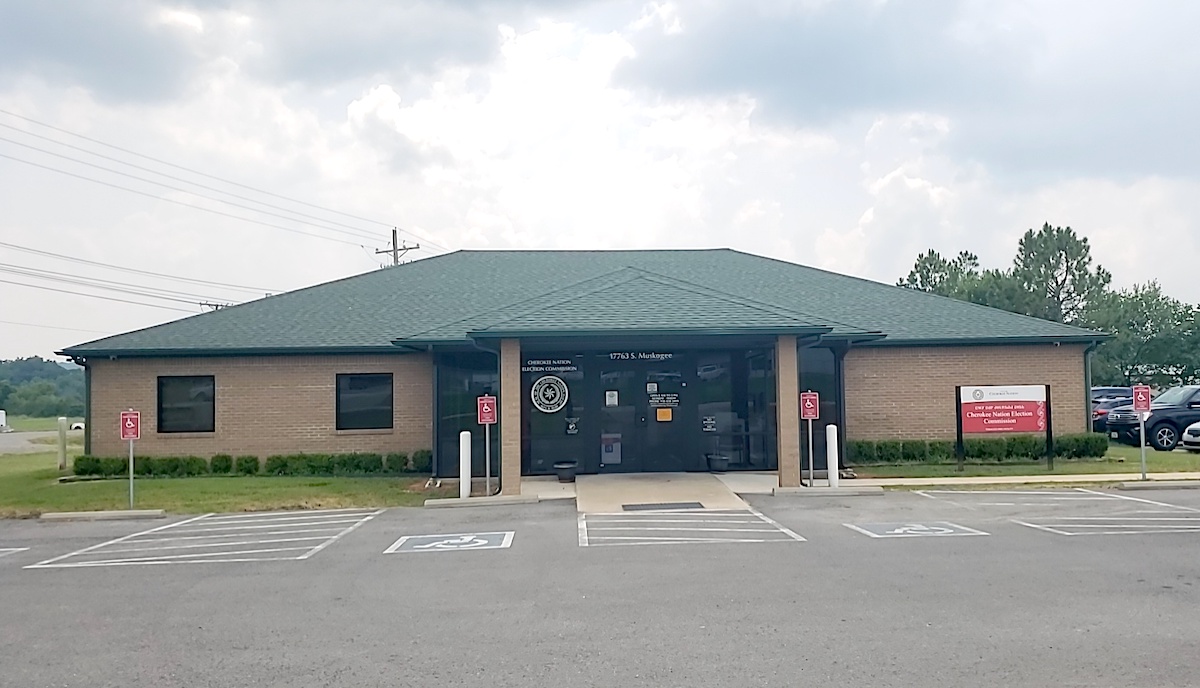
During the Aug. 2 Election Commission hearing, much of the debate surrounded the semantics of the word “knowingly.”
Item G in Section 44 of the Cherokee Nation Election Code states: “No candidate or financial agent, corporation, legal entity or other person shall knowingly accept a campaign contribution or knowingly make or authorize political expenditures (….)”
Slover testified he knew that accepting contributions from businesses was in violation of the Cherokee Nation Election Code, but he said he did not know the check he accepted was written from Action Floors, LLC. He said he believed the check was written from the McCarty’s.
Ferate argued that Slover lacked “mens rea,” which is the intention or knowledge of wrongdoing that constitutes part of a crime. Ferate said Slover accepted the check without knowing it was illegal, an argument he said was supported by the fact Slover and Dallis filed it in the financial disclosure report.
However, Chrissi Nimmo — deputy attorney general of the Cherokee Nation — argued that Slover’s inability to see the source of the check did not exonerate him from wrongdoing.
“[Slover] testified that he knew he couldn’t take take a check from a business. He didn’t know [this check] was a business check. He didn’t pay attention, he didn’t look at it,” Nimmo said. “He knew the law, he took the check, he deposited the check, and our position is that’s sufficient.”
Ferate argued that Slover and his team were required to be given election training, which they did not receive. Item C in Section 42 of the Cherokee Nation Election Code states: “The Election Commission may, at their discretion, hold a training session for all candidates and all financial agents and make it mandatory.”
“If you’re going to enforce such an aggressive regulatory approach, you better train folks first,” Ferate told NonDoc.
Ferate also argued that under Item D in Section 46 of the Cherokee Nation Election Code, which states that “the Election Commission shall give the candidate an opportunity to correct any deficiency or error in his or her reports,” Slover should have been allowed to return the contribution, which he did on the same day the charge was filed.
Nimmo argued that the statute was not applicable in this instance.
“In this case, there is a contribution that’s clearly not allowed by the law, and it doesn’t say anything about returning contributions,” Nimmo said. “It does say things about fixing errors in your report, but it doesn’t say that you can return a contribution that was illegally accepted, and then you’re clear of any further consequences.”
Accusations against current councilmember
During the Aug. 2 hearing, Ferate called Clayton Fulton as a witness. Fulton is a law student at the University of Michigan. Fulton brought forth a July 2019 financial disclosure report from current District 12 Councilmember Dora Patzkowski, which shows a $200 “in-kind contribution” — a non-monetary contribution, usually a good or service — from the Delaware Tribe of Indians.
As Item A in Section 43 of the Cherokee Nation Election Code states, “Contributions may only be made by individual natural persons. No corporation, partnership, and/or any other legal entity shall contribute to any Cherokee Nation campaign or candidate.”
During the Election Commission’s decision in the Slover matter, it was noted that “the administrator shall report these accusations to the Cherokee Nation Marshal Service and the Cherokee Nation Attorney General.”
NonDoc inquired about Patzkowski’s disclosure report, but Julie Hubbard, the Cherokee Nation’s communications director, said “the Cherokee Nation Attorney General’s Office does not have a comment at this time.”
In the 2019 Cherokee Nation election, principal chief candidate David Walkingstick was disqualified for accepting in-kind contributions from Cherokees for Change LLC, a political action committee.
Follow @NonDocMedia on:
Comingdeer’s election challenges
In the District 7 race, David Comingdeer filed six different claims in his official election challenge. The first claim concerned his request for a recount, which failed to proceed because Comingdeer did not personally serve the recount request to his opponent, Joshua Sam, by the July 28 deadline.
The Cherokee Nation Supreme Court considered Comingdeer’s challenge in an Aug. 6 hearing.
“[Slover’s] claim has no merit,” the court ruled. “The recount failed to proceed due to [Slover’s] error in providing proper service to respondent Sam as required by statute.”
Comingdeer sent the recount request to the Cherokee Nation Election Commission on July 28, the day of the deadline, but did not send the recount request to Sam until Aug. 2.
Comingdeer’s second challenge claim alleged that the Cherokee Nation Election Commission failed to properly preserve ballots. Comingdeer argued that “no hearing was conducted to determine whether the ballots were preserved as required” by Item G of Section 93 of the Cherokee Nation Election Code.
“Cherokee Nation Election Commission testified as to election procedures and the storage and security of ballots,” the court ruled. “[Comingdeer] provided no evidence to contradict the Cherokee Nation Election Commission’s testimony.”
Comingdeer’s third challenge claim alleged that the Cherokee Nation Election Commission interfered with the election “by mailing out absentee ballot request forms to registered voters which included a letter for candidate Joshua Sam saying in part ‘Thank you for pledging to vote for me to represent you on the Tribal Council.'”
Comingdeer’s challenge alleged that “the mailing was done with the intent to deceive the registered voter as part of a scheme to induce the voter to believe that the Election Commission was supporting candidate, Joshua Sam.”
But the Cherokee Nation Supreme Court ruled that the envelopes in question were sent by Sam’s campaign, not by the government.
“Testimony from Cherokee Nation Election Commission staffers, along with the physical evidence (…) demonstrates that [Sam’s] envelope at issue did not originate from the Cherokee Nation Election Commission,” the court ruled.
Comingdeer’s fourth challenge alleged that two registered voters received absentee ballots as a result of forged absentee ballot request forms. Comingdeer only submitted one affidavit to that effect, from Lara Brewer.
Sam entered evidence that showed Brewer completed the absentee ballot request form. The Cherokee Nation Election Commission records showed that Brewer was sent an absentee ballot but did not vote in the runoff election.
The court ruled that Brewer completed the absentee ballot request form, gave the signed form to a third party for return, but ultimately did not vote in the runoff election.
Comingdeer’s fifth challenge claim alleged that Sam was asking to notarize and collect ballots from registered voters.
The Cherokee Nation Supreme Court said in its opinion that such action was legal.
“Title 26 does not prohibit a candidate from notarizing ballots for voters. Title 26 does not limit the number of absentee ballots a notary can notarize during an election,” the court wrote. “Finally, Title 26 does not restrict a candidate from going door to door to campaign, to offer notary services, or to assist a voter in returning their cast absentee ballots to the Cherokee Nation Election Commission.”
Comingdeer’s final challenge claim stated that the Cherokee Nation Election Commission has “refused to release the voter history of the runoff (election) as required by law.”
The Cherokee Nation Supreme Court ruled in its opinion that “the voter list shall be released once the results are certified.”
The court also stated that “[Section 25] is silent as to when the Cherokee Nation Election Commission must release the most recent voter list.”









